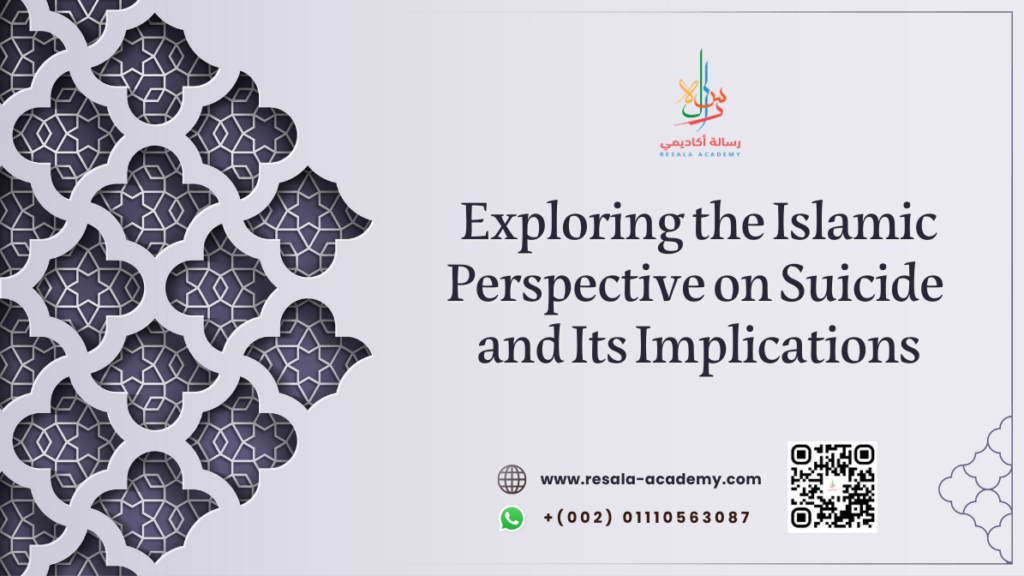Table of Contents
Exploring the Islamic Perspective on Suicide and Its Implications
The Islamic perspective on suicide is complex and deeply rooted in faith teachings. Though punishable by law, the subject of suicide and its implications are highly controversial among Muslims both inside and outside their respective communities. Many moral and ethical considerations arise when exploring the concept of suicide within the framework of religion, as this act has been traditionally viewed negatively due to societal norms. We have created this blog post to address these issues from a respectful and inquisitive standpoint in hopes that readers can gain insight into how both scriptural texts, scholarly interpretations, as well as personal testimonies may affect one’s perception of its gravity.
Definition of suicide and what it involves
Suicide is the act of deliberately ending one’s own life. It involves an individual taking their own life, either by using a weapon or other means to cause death. Suicide can be seen as a result of overwhelming psychological pain and distress in an individual, with this pain often being caused by social, emotional, or physical factors. Those who attempt or complete suicide often feel that they have no other option but to take their own life to escape or end the pain and distress.
The suicide rate for adults has been steadily increasing over the past few decades, though rates vary among different age groups. Suicide is a major public health issue and can have long-term effects on the family and friends of those who have died by suicide. It is important to be aware of the signs and symptoms of suicidal ideation to provide support and resources to individuals at risk. Early identification and intervention can help prevent suicide deaths.
By understanding suicide and its underlying causes, we can work to prevent it from happening in our communities. Through education, awareness-raising efforts, and the implementation of effective treatment strategies, suicide rates can be reduced. Support for those at risk is essential in reducing suicide deaths and decreasing the burden of this public health issue.
It is also important to remember that suicide is complex, and there is no single cause or set of causes. Every individual experiences pain and distress differently, so it is essential to provide understanding and support for those in crisis. Everyone deserves access to mental health resources and help when they need it most. Together, we can work to reduce suicide deaths and create a world where everyone feels safe, supported, and valued.
Overview of basic Muslim beliefs about suicide
In Islam, suicide is considered a major sin. According to Islamic teachings, life is seen as something precious and sacred that should be preserved and respected. Suicide represents an abuse of the gift of life that has been given to us by Allah.
In the Islamic tradition, it is believed that those who commit suicide will not receive a proper burial and will be denied entry into paradise. Those who have committed suicide are condemned in the hadith (sayings of the prophet Muhammad) as having taken “self-murder” which is a grave sin.
The death of someone who has committed suicide may be mourned, but the family and friends should strive to remember the life of the individual, rather than focus on how they died. Prayers are offered for those who have taken their own lives, to seek Allah’s mercy and forgiveness for them.
In some cases, Islamic teachings allow for the possibility of mercy, in that people who commit suicide out of mental illness or duress may be forgiven by Allah. In cases such as these, family members should strive to remember their loved ones with kindness and compassion. Ultimately, it is believed that Allah is Just and Merciful and has ultimate authority over one’s fate.
In short, suicide is considered a great sin in Islam and those who have committed it are denied entry into paradise. It is important to remember those who have taken their own lives with kindness and compassion while understanding that Allah is Just and Merciful. In some cases, mercy may be granted to those who have committed suicide. Ultimately, it is up to Allah to forgive and show mercy.
The Islamic faith teaches us to strive for a life of peace and contentment, avoiding harm and abuse to ourselves or others. Suicide should be discouraged as the ultimate act of despair that can rob individuals of all potential in this life and the hereafter. We should strive to seek peace, hope, and purpose in our lives to honor the gift of life that Allah has bestowed upon us.
The importance of understanding Islamic views toward suicide
Islamic views on suicide are clear and uncompromising: it is strictly prohibited under all circumstances. Suicide, or self-murder, is seen as one of the gravest sins in Islamic law and culture. In Islam, suicide is considered a form of disbelief (kufr) because it is an act of not trusting Allah to provide for you and take care of your needs in this life. The Qur’an is quite explicit about suicide: “And do not kill yourselves [or one another]. Indeed, Allah is to you ever Merciful.” (Quran 4:29).
In addition, the Hadith also contains numerous warnings against self-harm and suicide such as “The Prophet (PBUH) said, “Whoever purposely throws himself from a mountain and kills himself, will be in the (Hell) Fire falling into it and abiding therein perpetually forever; and whoever drinks poison and kills himself with it, he will be carrying his poison in his hand and drinking it in the (Hell) Fire wherein he will abide eternally forever; and whoever kills himself with an iron weapon, will be carrying that weapon in his hand and stabbing his `Abdomen with it in the (Hell) Fire wherein he will abide eternally forever.” Furthermore, suicide is discouraged because it interrupts the natural order of life and death, which is determined by Allah alone.
The Islamic view on suicide recognizes that many people are experiencing deep personal struggles and despair which may lead them to end their lives. It is important to note that Islam does not blame individuals for wanting to commit suicide, but it instead sees it as a sign of psychological distress and depression. Therefore, the focus should be on helping those with suicidal ideation by providing them with spiritual guidance, mental health support, and assistance in finding solutions to their problems. This may include seeking help from family, friends, and qualified professionals. Additionally, those affected by suicide should be supported with love and compassion, not blame or judgment. It is important to remember that Allah does not burden anyone with more than they can bear and He will always provide a way out for those in need of help.
In conclusion, understanding Islamic views toward suicide is essential to know how to approach and handle this sensitive situation with compassion and understanding. It is important to remember that Allah does not burden anyone with more than they can bear and He will always provide a way out for those in need of help. Therefore, it is our duty as Muslims to do whatever we can to help those in need and provide them with the necessary spiritual, mental, and emotional support. Only then can we truly honor Allah’s commands and ensure that no one is left to suffer alone. May Allah give us all the strength to help those who are suffering in any way possible. Ameen!
How does Islam treat those who have committed suicide?
Islam does not condone suicide and considers it a major sin. Islam believes that taking one’s own life is an act of disobedience to Allah and that life belongs only to Him. According to the teachings of Islam, life is a precious gift from Allah and it should be respected. Those who have committed suicide are not denied the mercy of Allah, but those who have taken their own lives will still be held accountable for their actions in the hereafter. Muslims believe that on Judgement Day all matters will be judged by Allah, and they may receive forgiveness or punishment depending on the circumstances. It is also believed that those who have committed suicide may not be able to receive a proper burial and will not be admitted into Paradise or Jannah.
As such, Islam strongly discourages suicide and encourages its followers to seek help if they ever feel lost or hopeless. The Prophet Muhammad (PBUH) said, “He who commits suicide by throttling shall keep on throttling himself in the Hell Fire (forever) and he who commits suicide by stabbing himself shall keep on stabbing himself in the Hell Fire”. Thus, Muslims are urged to seek help from friends, family members, and professionals if they ever feel overwhelmed by life’s struggles. As difficult as life can be, Muslims strive to remember that it is Allah’s mercy alone that offers true comfort and salvation. May Allah Almighty guide us all on the right path. Ameen.
Examination of different Quranic verses related to death and its implications for those who have committed suicide
In the Quran, it is clear that suicide is forbidden and those who have committed this crime will be punished. In Surah An-Nisa verse 29, Allah says: “And do not kill ˹each other or˺ yourselves. Surely Allah is ever Merciful to you.” From this verse, we can see that suicide is forbidden and that Allah is merciful to those who have committed this crime.
The Quran also mentions the punishment for those who commit suicide. In Surah Al-Baqarah verse 195, Allah says: “And do not throw [yourselves] with your [own] hands into destruction [by refraining]”. This verse warns us against the terrible consequences of committing this act. It indicates that committing suicide will lead to greater punishment in the hereafter.
In addition, the Quran also offers guidance for those who have committed suicide or are considering it. In Surah An-Nisa verse 30, Allah states: “And whoever does that in aggression and injustice – then We will drive him into a Fire And whoever does that in aggression and injustice – then We will drive him into a Fire. And that, for Allāh, is [always] easy”. This verse serves as a warning to those who are contemplating suicide and shows that committing this act is not an acceptable solution to one’s problems.
In conclusion, the Quran provides clear guidance about the consequences of suicide and encourages those who have committed or are considering it to seek help and repentance. It is important for us to remember the mercy of Allah and not to despair no matter how desperate our situation may seem. May Allah guide us on the right path and keep us away from sin. Ameen!
Resala Academy Offers Online Islamic Classes
At Resala Academy, we offer online Islamic classes that are designed to help individuals learn about the teachings of Islam. Our courses cover a wide range of topics, including Islamic principles and ethics, Quranic studies, Hadith Studies, Fiqh or Islamic jurisprudence, and Islamic history. All our courses are taught by qualified instructors who have a strong knowledge of the Quran and Islamic teachings. With our comprehensive online learning platform, you can learn at your own pace in the comfort of your home or anywhere with an internet connection.
Our classes are available to individuals of all levels and backgrounds, so everyone can benefit from them. Whether you’re looking to deepen your understanding of Islam or gain a better understanding of Islamic teachings, Resala Academy is here to help you get the most out of your learning experience. We hope this article has helped provide insight into Islam’s take on suicide and its implications for those who have committed this act. May Allah Almighty guide us all on the right path. Ameen.
FAQ
Q: Is suicide forbidden in Islam?
A: Yes, suicide is strictly forbidden in Islam and those who have committed this act will be punished. The Quran warns against the consequences of committing suicide and encourages those considering it to seek help from friends, family members, and professionals.
Q: What are the implications for those who have committed suicide?
A: Those who have committed suicide will be punished in the hereafter, and they are advised to seek repentance and forgiveness from Allah. The Quran encourages us to remember Allah’s mercy and not to despair no matter how desperate our situation may seem.
Q: How can I learn more about Islam?
A: Resala Academy offers online Islamic classes that are designed to help individuals learn about the teachings of Islam. Our courses cover a wide range of topics, including Islamic principles and ethics, Quranic studies, Hadith Studies, Fiqh or Islamic jurisprudence, and Islamic history. All our courses are taught by qualified instructors who have a strong knowledge of the Quran and Islamic teachings. With our comprehensive online learning platform, you can learn at your own pace in the comfort of your home or anywhere with an internet connection. We hope this article has provided insight into Islam’s take on suicide and its implications for those who have committed this act. May Allah Almighty guide us all on the right path. Ameen. If you have any further questions, please do not hesitate to contact us at Resala Academy and we will be more than happy to assist you in any way that we can. Thank you for visiting our website!
Conclusion
Overall, there is a great deal of complexity, nuance, and contextualization to consider when examining the Islamic perspective on suicide. It is important to be aware that Muslim traditions and opinions on this subject offer multi-layered views. We must take into account the perspectives, not just the prohibitions. To explore more in-depth sources and reflect upon the ethical dilemmas within this issue, understanding the sources of this discussion is essential. Resala Academy offers online classes and insightful teachings on Islamic ethics to provide answers to questions such as these. In doing so, we can develop a richer understanding of our ethical commitments as Muslim members of society and strive for greater mental health awareness while being supported in our faith.




